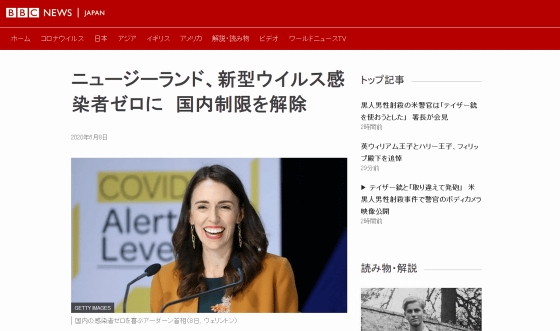What is the 'positive impact' of a strict urban blockade on people?

With the pandemic of the new coronavirus infection (COVID-19), strict urban blockades (lockdowns) have taken place in some countries. A survey conducted in New Zealand, one of the countries with particularly strict urban blockades, found that as many as two-thirds of New Zealanders felt that the blockade had had a positive effect. Turned out.
Silver linings of the COVID-19 lockdown in New Zealand
Silver linings in lockdown, Media releases, University of Otago, New Zealand
https://www.otago.ac.nz/news/news/releases/otago826250.html
New Zealand Survey Reveals The Positive Aspects of The Country's Strict Lockdown
https://www.sciencealert.com/new-zealand-survey-reveals-what-people-actually-liked-about-their-lockdown
In New Zealand, on March 19, 2020, as a general rule, all foreigners were banned from entering the country, and on the 25th, a national emergency declaration was issued to blockade the city with the highest degree of caution. Was carried out. Most offices were closed, schools were closed, and the city blockade, which forced residents to wait at home, continued for a month, and in June it announced that there were no COVID-19 patients in the country. ..
New Zealand lifts domestic restrictions to zero new virus infections-BBC News
https://www.bbc.com/japanese/52960236

Although the number of people infected with the new coronavirus has continued since then, New Zealand is listed as one of the most successful countries in the world. Matthew Jenkins , a psychologist at the University of Otago, New Zealand, conducted an online survey of 2010 subjects from April 15-18, 2020, during the blockade of the city. Did you experience any positive aspects during the blockade of 4 cities? '
Analyzing the survey responses, 1227 (64%) of the 2010 respondents said they 'experienced the positive side of the city blockade.' This shows that as many as two-thirds of New Zealanders feel the positive impact of the city blockade. Nearly half of all subjects answered that they had a positive personal impact, and nearly one-third answered that they had a positive social impact.
'The blockade of the city was a major turning point in people's lives, creating opportunities to stop, appreciate life, face and connect with others,' said Jenkins. I reported that the act of helping someone became more common. ' It's unclear what long-term impact the pandemic experience will have on future lives, but it's clear that they have had some positive experience, at least during the city blockade of the survey. ..

There is also a free text box in this questionnaire, and many of the subjects answered that they had regained the sense of 'old-fashioned community consciousness and compassion that was not clear before the blockade of the city.' This heightened sense of community is thought to be due to the fact that the pandemic and the blockade of the city have made people more aware of their position in the world and those around them.
In addition, 'the flexibility of working from home and shortened commuting time' was often mentioned as a positive effect of the city blockade. This allowed people to spend more time with their families, and more than 30% of subjects said they had 'more time spent on exercise and hobbies,' reporting increased independence in their lives. We also know that there are many subjects.
Blockades generally tended to spend more on 'what they need than what they want' and spend more time with family and friends than ever before. 'With social distance measures in place, technology has become a major way for people to connect socially and work through online services such as video conferencing,' said Jenkins. I started talking to my father who lives in Japan every day. ”Another subject joined an international online knitting group to maintain social interaction.”

In addition, many subjects were aware that they were 'contributing to the local community' regarding the blockade of the city, and were willing to comply with the restrictions on going out. This sense of contribution helped keep the weaker beings in the community as safe as possible by putting up with them.
The research team believes that the New Zealand government's message played an important role in why people were contributors. 'The New Zealand government provides daily updates on the number of cases, recoverers and tests, and this high degree of transparency has been recognized internationally,' the research team wrote, telling the public about the reality of the pandemic and themselves. Claimed to have helped figure out what could be done.
'I think the level 4 blockade helped the country stay in control of the virus,' said one respondent, suggesting that the public understood the rationale for the city blockade. I will. Another respondent said that the blockade of the city has made New Zealanders feel united and proud, such as 'New Zealand may be a small country, but we are doing a great job.'
'Our findings show that many people have found a positive side in spite of times of confusion, anxiety and psychological distress.' 'Many despite the effects of urban blockades.' People meet their psychological needs for social connectivity and autonomy, and we speculate that this is likely to have influenced compliance with the blockade of the city, 'said the research team.

Related Posts:
in Note, Posted by log1h_ik







